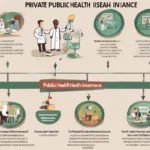Introduction to High-Deductible Health Insurance Plans
High-deductible medical insurance policies have gained essential consideration in recent occasions resulting from their cost-saving potential and flexibility. These plans typically lower month-to-month premiums, however, embody larger deductibles compared with standard medical insurance coverage selections. Understanding the pros and cons of these plans is crucial for individuals and households evaluating their healthcare coverage options.
Pros of High-Deductible Health Insurance Plans

Cost Savings and Lower Premiums
One of the crucial advantages of high-deductible medical insurance policies is their lower month-to-month premiums. For individuals and households who are often healthy and do not anticipate frequent medical visits, this will lead to substantial financial savings over time. By paying lower premiums, policyholders can allocate extra of their funds in the direction of completely different essential payments or monetary financial savings.
Health Savings Accounts (HSAs)
Many high-deductible health plans are eligible for Health Savings Accounts (HSAs). HSAs present a triple tax profit: contributions are tax-deductible, earnings are tax-free, and withdrawals for licensed medical bills are tax-free. This distinctive attribute not only helps individuals save for current medical payments but also permits long-term financial savings for future healthcare wants.
Consumer Empowerment and Flexibility
High-deductible plans sometimes empower customers to make extra-educated healthcare alternatives. With higher financial obligations and larger deductibles, individuals might turn into extra cost-conscious when on the lookout for medical corporations. Some plans also present the flexibility to see specialists without utilizing a referral, providing higher freedom in deciding on healthcare suppliers.
Potential for Preventive Care Focus
Due to the excessive out-of-pocket costs associated with high-deductible plans, individuals might prioritize preventive care and wellness visits. Investing in preventive corporations may result in early detection of well-being factors and most likely lower whole healthcare costs in the long run.
Cons of High-Deductible Health Insurance Plans

Higher Out-of-Pocket Costs
The most essential drawback of high-deductible health insurance plans is the higher out-of-pocket costs earlier than the deductible is met. This shall be financially tough for individuals who require widespread medical care or have ongoing circumstances. In such circumstances, raising the deductible yearly might result in substantial payments.
Risk of Delayed Care
Individuals enrolled in high-deductible plans might delay needed medical care or prescriptions ensuing from worth points. Delayed care may end up in worsening well-being circumstances and larger healthcare payments ultimately. It is essential for policyholders to steadily earn points with well-timed entry to medical remedies.
Most Popular
Limited Coverage Until Deductible is Met
Until the deductible is met, high-deductible plans might present restricted safety for corporations. Routine doctor visits, pharmaceuticals, and diagnostic assessments might require a full price until the deductible is satisfied. This is mostly a deterrent for individuals who anticipate widespread healthcare needs.
Complexity in Comparing Plans
Navigating the nuances of high-deductible health insurance plans shall be sophisticated. Policyholders have to carefully look at deductibles, out-of-pocket maximums, coated corporations, and group suppliers all through completely different plans to ensure they select the selection that best meets their healthcare needs and financial situation.
Conclusion
High-deductible well-being insurance plans present a gradual stream of monetary financial savings and financial obligations for individuals and households. While they lower premiums and the potential for tax-advantaged monetary financial savings by HSAs, as well as they embody larger out-of-pocket costs and the possibility of delayed care till deductibles are met. Understanding these benefits and cons is essential for making an educated determination about healthcare safety.
FAQ: High-Deductible Health Insurance Plans

What are high-deductible medical insurance policies?
High-deductible medical insurance policies are healthcare plans that require policyholders to pay larger out-of-pocket costs sooner than the insurance coverage kicks in. These plans typically have decreased month-to-month premiums in comparison with conventional medical insurance selections.
Who should consider a high-deductible medical insurance coverage plan?
High-deductible medical insurance plans are also acceptable for individuals and households who’re often healthy, have few medical payments, and want to save on month-to-month premiums. They are also useful for a lot of people who can profit from Health Savings Accounts (HSAs) to save lots of cash for medical payments tax-free.
What are some great benefits of a high-deductible medical insurance policy?
- Lower premiums: These plans sometimes embody decreased month-to-month premiums, which can save money for policyholders.
- Health Savings Accounts (HSAs): Eligibility for HSAs permits tax-deductible contributions and tax-free withdrawals for medical payments.
- Consumer empowerment: They empower individuals to make educated healthcare alternatives and might encourage preventive care.
What are the drawbacks of a high-deductible medical insurance policy?
- Higher out-of-pocket costs: Policyholders ought to meet a greater deductible sooner than insurance coverage safety begins, leading to most likely essential out-of-pocket payments.
- Risk of delayed care: Due to worth points, some individuals might delay wanted medical care or prescriptions, which can worsen well-being circumstances.
- Limited safety till the deductible is met: Certain corporations are most likely not coated or might require a full price till the deductible is met.
How can I decide if a high-deductible medical insurance coverage plan is true for me?
Consider your well-being, anticipated medical payments, and financial performance to cover out-of-pocket costs. Evaluate the plan’s deductible, out-of-pocket most, coated corporations, and group suppliers to find out if it aligns with your healthcare needs and funds.
Are high-deductible medical insurance policies acceptable for people with continuous circumstances?
For individuals with continuous circumstances or frequent medical needs, high-deductible medical insurance plans are most likely not primarily essentially the most cost-effective different due to the extreme out-of-pocket costs. These individuals might generate additional revenue from a standard medical insurance policy with decreased deductibles and larger premiums.
How do I open a Health Savings Account (HSA) with a high-deductible medical insurance coverage plan?
To open an HSA, you have to be enrolled in a high-deductible wellness plan that meets IRS requirements. You can typically open an HSA by your monetary establishment, credit union, or financial institution that gives HSA corporations. Contributions to an HSA shall be deducted out of your paycheck instantly or as a separate deposit as much as the IRS-imposed annual cap. Up to the IRS-imposed annual cap, you possibly can fund your HSA with money deducted individually and instantly out of your paycheck.
Can I reap the benefits of funds from my Health Savings Account (HSA) for non-medical payments?
While HSAs are primarily designed for medical payments, after age 65, you might be able to withdraw funds for non-medical payments without penalty, though earnings tax will apply. Before age 65, non-medical withdrawals incur a penalty together with earnings tax.
How do I look at a completely different high-deductible medical insurance policy?
When evaluating high-deductible medical insurance policies, consider parts akin to
- Deductible: The amount it is important to pay out-of-pocket sooner than safety begins.
- Premiums: Monthly funds for the insurance plan.
- Out-of-pocket most: The most amount you may pay in 12 months sooner than insurance coverage covers 100% of coated corporations.
- Covered corporations: types of medical corporations coated beneath the plan.
- Network suppliers: doctors, hospitals, and completely different healthcare suppliers are included throughout the plan’s group.
Where can I uncover additional particulars about a high-deductible medical insurance policy?
For extra-detailed particulars about high-deductible medical insurance policies and how they may fit your healthcare needs, search for recommendations from insurance coverage protection suppliers, healthcare professionals, or revered online assets specializing in medical insurance.










This site is now my go-to for this kind of information. Great work!
Thanks for sharing this valuable and informative content. I’ll be back regularly!
Superb article. I’ve learned so many new things today. Thanks!
Thanks for sharing this valuable content. Very well structured and easy to read!
This article is both informative and enjoyable to read.
This site is now my go-to for this kind of information. Great work!
It’s so well-written and clear! I really enjoyed this post. By the way, if you’re looking for more great content, check out this site: https://www.finanalys.com/direct-method-of-cash-flow-management/.
It’s always a pleasure to read your posts. Keep educating us! By the way, if you’re looking for more great content, check out this site: https://www.gagnerargent.online/generer-des-revenus-avec-contenu/.
Your blog is now my reference for this kind of information. By the way, if you’re looking for more great content, check out this site: https://www.gagnerargent.online/revenu-complementaire/.
Thank you for this post! I love how you make complex topics easy to understand.
This post really helped me understand the topic. Thank you!
Thanks for sharing this valuable content. Very well structured and easy to read!
This is exactly the type of post I was looking for. Thank you so much!
This blog is a goldmine of useful information. I’ll be back regularly!
This site is such a valuable resource for information, thank you!
An excellent article, very well-documented and easy to read. By the way, if you’re looking for more great content, check out this site: https://www.aiearner.co/unlocking-passive-income-through-ai-driven-investments-a-comprehensive-guide/.
Thank you for this post! I love how you make complex topics easy to understand.
This site is such a valuable resource for information, thank you!
This post is incredibly well-written! I learned a lot by reading it.
This is exactly what I needed to better understand the subject.
This was a very enlightening read, thanks for your work. By the way, if you’re looking for more great content, check out this site: https://www.gagnerargent.online/reussir-en-investissement-et-trading/.
This was a very enlightening read, thanks for your work.
I truly appreciate the clarity in your explanations.
Thanks for sharing this valuable and informative content. I’ll be back regularly!
An excellent article, I highly recommend it to all my friends. By the way, if you’re looking for more great content, check out this site: https://www.codetalenthub.io/offshore-web-development/.
You made a complex topic very simple to understand. Well done! By the way, if you’re looking for more great content, check out this site: https://www.newsmixer.online/effective-business-planning/.
It’s always a pleasure to read your posts. Keep educating us! By the way, if you’re looking for more great content, check out this site: https://commentgagner.blog/devenir-un-super-tuteur-en-ligne/.
I learned so many new things from reading this post. By the way, if you’re looking for more great content, check out this site: https://www.aiearner.co/negotiation-tips-for-freelancers/.
This site is such a valuable resource for information, thank you!
Your expertise shines through in every sentence, thank you for this post.
This post really helped me understand the topic. Thank you!
It’s a pleasure to read articles that are so well structured.
I found this article particularly useful, I will gladly read it again.
This site is now my go-to for this kind of information. Great work!
This article has taught me a lot, thank you for your expertise.
I didn’t expect to find so much useful information, thank you! By the way, if you’re looking for more great content, check out this site: https://aiearner.co.
Thank you for these practical tips, they will be very useful to me!
Thanks for this detailed analysis. I’ve shared this post with my friends.
Thank you for this article. It is both complete and easy to understand.
I learned a lot from this article, thanks for your expertise. By the way, if you’re looking for more great content, check out this site: https://www.newsmixer.online/physician-mortgage-loans-2024/.
Thank you for sharing this valuable content. Very well structured and easy to read!
Thank you for this precise lighting, it answers my questions exactly.
Thanks for this detailed analysis. I’ve shared this post with my friends.
Many thanks for this well structured and clear content.
A great article, I highly recommend it to all my friends.
I highly recommend this blog to anyone interested in this topic.
This is exactly what I needed to better understand this topic.
This article was exactly what I was looking for. Thank you very much! By the way, if you’re looking for more great content, check out this site: https://commentgagner.blog/affiliation-rentable/.
An excellent resource, I appreciate the quality and clarity of the explanations.
Thanks for this detailed analysis. I’ve shared this post with my friends.
It was a very enriching read, thank you for your work. By the way, if you’re looking for more great content, check out this site: https://www.gagnerargent.online/monetiser-un-blog/.
I will definitely return to this site for more content like this. By the way, if you’re looking for more great content, check out this site: https://www.newsmixer.online/exploring-alternative-investments/.
I like the accessible tone of your articles, thank you for making this topic understandable.
Thank you for your expertise, your articles are always exciting to read.
Thank you for this exceptional work. It’s an enjoyable and informative read. By the way, if you’re looking for more great content, check out this site: https://www.finanalys.com/top-7-budget-apps/.
Thank you for these step-by-step explanations, it makes everything so much clearer! By the way, if you’re looking for more great content, check out this site: https://commentgagner.blog/savoir-sur-le-marketing-daffiliation/.
Thanks for sharing this valuable content. Very well structured and easy to read!
Thank you for this well-structured and clear content. By the way, if you’re looking for more great content, check out this site: https://www.finanalys.com/direct-vs-indirect-cash-flow-methods/.
A clear and detailed approach, exactly what I needed.
Well-structured content that gets straight to the point. Excellent work! By the way, if you’re looking for more great content, check out this site: https://www.shortener.cloud/facebooks-biggest-controversies/.
It was a very enriching read, thank you for your work.
Congratulations for this article, I will come back to read the next ones.
Your blog is now in my favorites to check it regularly!
A clear and insightful read, keep publishing content like this! By the way, if you’re looking for more great content, check out this site: https://www.newsmixer.online/modern-banking/.
This post really helped me understand the topic. Thank you!
This article allowed me to see this topic from another angle, thank you!
Thank you for this article which is both well written and informative.
This article has taught me a lot, thank you for your expertise.
Your expertise in this field is impressive, thank you for this article!
Thank you for the accuracy and depth of this analysis.
This is exactly what I needed to better understand the subject.
I learned so many new things from reading this post. By the way, if you’re looking for more great content, check out this site: https://commentgagner.blog/comment-creer-un-portfolio-en-ligne/.
You made a complex topic very simple to understand. Well done!
This article is incredibly well written! I learned a lot by reading it.
This is exactly what I needed to better understand this topic. By the way, if you’re looking for more great content, check out this site: https://commentgagner.blog/coaching-personnel-101/.
This site is a real resource of information, thank you very much!
I will definitely be coming back to this site for more content like this.
I like the accessible tone of your articles, thank you for making this topic understandable.
I like the way you structure your articles, it makes it easier to read.
This article goes straight to the point while being very complete. Thank you for that!
Thanks for this post. It’s both comprehensive and easy to understand. By the way, if you’re looking for more great content, check out this site: https://finanalys.com.
Great article. I learned a lot of new things today. Thank you!
This article allowed me to see this topic from another angle, thank you!
It’s always a pleasure to read your articles, keep it up! By the way, if you’re looking for more great content, check out this site: https://shortener.cloud.
Congratulations for this article, I will share it with my colleagues.
This article is both informative and enjoyable to read.
This blog is an essential reference for me from now on. By the way, if you’re looking for more great content, check out this site: https://commentgagner.blog/creer-une-boutique-en-ligne/.
This article was exactly what I was looking for. Thank you very much!
Thank you for this exceptional work. It’s an enjoyable and informative read.
It’s so well-written and clear! I really enjoyed this post.
An excellent article, I highly recommend it to all my friends.
It is always a pleasure to read your articles. Keep teaching us!
A very well researched article, with reliable and complete information.
Your blog is a real gold mine for information on this topic.
It’s always a pleasure to read your posts, keep it up!
Thanks for this very useful and well-written post. By the way, if you’re looking for more great content, check out this site: https://www.aiearner.co/unlocking-the-potential-of-ai-in-content-creation-writing/.
I really appreciate the clarity of your explanations. By the way, if you’re looking for more great content, check out this site: https://www.finanalys.com/understanding-the-income-approach/.
Thank you for this very useful and well-written article.
Congratulations for this article! It is full of useful and well explained information.
This site is a real resource of information, thank you very much!
I recommend this blog to anyone who wants to learn more about this topic.
Thank you for addressing this topic in such detail and clarity.
This is exactly what I needed to better understand this topic. By the way, if you’re looking for more great content, check out this site: https://www.gagnerargent.online/les-meilleures-strategies-de-monetisation/.
Keep writing such interesting and relevant articles!
Keep it up, it’s a real pleasure to read your articles.
This article has taught me a lot, thank you for your expertise.
The way you explain this topic is really accessible, well done!
This site is now my reference for this kind of information. Excellent work!
Your expertise in this field is impressive, thank you for this article! By the way, if you’re looking for more great content, check out this site: https://www.shortener.cloud/influence-of-twitter-on-viral-content/.
I find this blog really rewarding. Keep it up, this is exactly what I needed! By the way, if you’re looking for more great content, check out this site: https://www.newsmixer.online/modern-banking/.
This blog is a goldmine of useful information. I’ll be back regularly! By the way, if you’re looking for more great content, check out this site: https://www.mostexpensive.store/vintage-outdoor-furniture/.
I am going to share this article with everyone who might be interested.
This blog is a valuable resource for me, thank you very much.
This article is both informative and enjoyable to read.
The illustrations and examples add real value to this article, thank you!
This blog is an essential reference for me from now on.
Your expertise in this field is impressive, thank you for this article!
This site is such a valuable resource for information, thank you!
This is exactly what I needed to better understand the subject.
I found this article particularly useful, I will gladly read it again.
A very relevant analysis, I appreciate your points of view.
I didn’t expect to find so much useful information, thank you! By the way, if you’re looking for more great content, check out this site: https://www.codetalenthub.io/angularjs-migration-services/.
This article was exactly what I was looking for. Thank you very much!
Congratulations for this article, I will come back to read the next ones.
I highly recommend this blog to anyone interested in this topic.
A really useful and well structured article, I highly recommend it!
It is a pleasure to read such well-written and informative articles. By the way, if you’re looking for more great content, check out this site: https://www.shortener.cloud/amazon-handmade/.
Thank you for this post! I love the way you make complex topics easy to understand.
Thank you for these practical tips, they are easily applicable! By the way, if you’re looking for more great content, check out this site: https://www.shortener.cloud/selling-on-amazon-fba/.
I will come back to this site, your articles are really well done! By the way, if you’re looking for more great content, check out this site: https://commentgagner.blog/meilleures-formations-en-ligne/.
The way you explain this topic is really accessible, well done! By the way, if you’re looking for more great content, check out this site: https://commentgagner.blog/maitriser-la-bourse/.
Thank you for all this clear and useful information. By the way, if you’re looking for more great content, check out this site: https://www.finanalys.com/consumer-confidence-index/.
You have a unique way of approaching complex topics.
Your expertise shines through in every sentence, thank you for this post.
Thank you for your expertise, your articles are always exciting to read.
Keep writing such interesting and relevant articles!
The information shared here is of great value, thank you for your work.
Thanks for sharing this valuable and informative content. I’ll be back regularly! By the way, if you’re looking for more great content, check out this site: https://www.shortener.cloud/discover-the-top-tiktok-trends/.
I love the variety of topics covered on this blog. By the way, if you’re looking for more great content, check out this site: https://www.newsmixer.online/fintech-jobs-2024/.
Thank you for this post! I love the way you make complex topics easy to understand.
I highly recommend this blog to anyone interested in this topic. By the way, if you’re looking for more great content, check out this site: https://commentgagner.blog/impact-de-votre-tutorat-en-ligne/.
I won’t hesitate to return to this blog to read your next articles.
I highly recommend this blog to anyone interested in this topic.
I find this blog really enriching. Keep it up, it’s exactly what I needed! By the way, if you’re looking for more great content, check out this site: https://www.codetalenthub.io/custom-reactjs-web-development/.
This blog is a gold mine of useful information. I will come back regularly!
Thank you for this well-structured and clear content.
Many thanks for this well structured and clear content.
You have a unique way of approaching complex topics. By the way, if you’re looking for more great content, check out this site: https://www.newsmixer.online/crypto-investing-tips-for-2024/.
Keep writing such interesting and relevant articles! By the way, if you’re looking for more great content, check out this site: https://www.gagnerargent.online/investir-et-trader-en-ligne/.
An excellent article, very well researched and easy to read. By the way, if you’re looking for more great content, check out this site: https://www.gagnerargent.online/monetiser-un-blog/.
I will definitely return to this site for more content like this. By the way, if you’re looking for more great content, check out this site: https://www.gagnerargent.online/les-secrets-des-tiktokers-a-succes/.
Congratulations for this article, I will share it with my colleagues.
This article has taught me a lot, thank you for your expertise.
I will definitely be coming back to this site for more content like this. By the way, if you’re looking for more great content, check out this site: https://www.shortener.cloud/microsoft-copilot-in-bing/.
Thank you for this precise lighting, it answers my questions exactly.
A very well researched article, with reliable and complete information.
Thank you for this article which is both well written and informative.
Your expertise shines through in every sentence, thank you for this post.
This is exactly what I needed to better understand the subject.
Congratulations for this article, I will share it with my colleagues.
I really appreciate the clarity of your explanations.
An excellent resource, I appreciate the quality and clarity of the explanations. By the way, if you’re looking for more great content, check out this site: https://commentgagner.blog/maitriser-les-investissements-financiers/.
The information shared here is of great value, thank you for your work. By the way, if you’re looking for more great content, check out this site: https://www.shortener.cloud/most-binge-worthy-tv-on-netflix/.
I didn’t expect to find so much useful information, thank you!
It’s a pleasure to read articles that are so well structured.
It’s always a pleasure to read your articles, keep it up! By the way, if you’re looking for more great content, check out this site: https://www.mostexpensive.store/worlds-most-expensive-sneakers/.
Your blog is now in my favorites to check it regularly!
A great source of inspiration, I always learn something here.
A very relevant analysis, I appreciate your points of view.
Superb article. I’ve learned so many new things today. Thanks! By the way, if you’re looking for more great content, check out this site: https://www.finanalys.com/understanding-market-risk/.
It’s so well-written and clear! I really enjoyed this post.
This post is incredibly well-written! I learned a lot by reading it. By the way, if you’re looking for more great content, check out this site: https://www.newsmixer.online/rapid-wealth-accumulation-2024/.
This blog is an essential reference for me from now on. By the way, if you’re looking for more great content, check out this site: https://commentgagner.blog/plateformes-de-design-freelance-a-decouvrir/.
I find this blog really rewarding. Keep it up, this is exactly what I needed!
A clear and insightful read, keep publishing content like this!
Your blog is a real gold mine for information on this topic.
Superb article. I’ve learned so many new things today. Thanks!
This article is incredibly well written! I learned a lot by reading it.
Your expertise is felt in every sentence, thank you for this article.
I find this blog really inspiring and well documented.
Your blog is a real gold mine for information on this topic.
Thank you for this exceptional work. This is an enjoyable and informative read.
This article was exactly what I was looking for. Thank you so much! By the way, if you’re looking for more great content, check out this site: https://commentgagner.blog/production-de-videos-et-creation-de-contenu/.
Thanks for sharing this valuable and informative content. I’ll be back regularly!
This article allowed me to see this topic from another angle, thank you!
This is exactly the kind of resources I needed, thanks for sharing!
A pleasant and informative read, I discovered new perspectives.
Thank you for this comprehensive analysis, it was a great help to me. By the way, if you’re looking for more great content, check out this site: https://www.codetalenthub.io/angularjs-maintenance-and-support/.
Well-structured content that gets straight to the point. Excellent work!
Great article. I learned a lot of new things today. Thank you!
Thank you for this exceptional work. This is an enjoyable and informative read.
I am going to share this article with everyone who might be interested.
It’s always a pleasure to read your posts. Keep educating us! By the way, if you’re looking for more great content, check out this site: https://www.mostexpensive.store/most-expensive-jewelry-ever-sold/.
Thank you for all this clear and useful information. By the way, if you’re looking for more great content, check out this site: https://www.gagnerargent.online/investir-sur-les-marches-financiers/.
I like the way you structure your articles, it makes it easier to read.
I learned a lot from this article, thanks for your expertise.
Your articles are always of high quality, I am looking forward to them.
I am going to share this article with everyone who might be interested.
I like the accessible tone of your articles, thank you for making this topic understandable.
Your blog is a real treasure trove for information on this topic. By the way, if you’re looking for more great content, check out this site: https://www.codetalenthub.io/angularjs-migration-services/.
This post is incredibly well-written! I learned a lot by reading it. By the way, if you’re looking for more great content, check out this site: https://finanalys.com.
I will not hesitate to come back to this blog to read your next articles.
Keep writing such interesting and relevant articles!
Superb article. I’ve learned so many new things today. Thanks! By the way, if you’re looking for more great content, check out this site: https://www.shortener.cloud/tweetstorms-sur-twitter/.
Your blog is now my reference for this kind of information.
You have made a complicated subject very simple to understand. Congratulations!
I love this blog, keep posting these kinds of articles! By the way, if you’re looking for more great content, check out this site: https://www.gagnerargent.online/les-strategies-de-monetisation-en-ligne/.
The way you explain this topic is really accessible, well done!
I find this blog really enriching. Keep it up, it’s exactly what I needed! By the way, if you’re looking for more great content, check out this site: https://www.gagnerargent.online/investissement-et-trading-en-ligne-2024/.
This is exactly what I needed to better understand the subject. By the way, if you’re looking for more great content, check out this site: https://www.mostexpensive.store/world-of-numismatic-treasures/.
Your blog is now in my favorites to check it regularly! By the way, if you’re looking for more great content, check out this site: https://commentgagner.blog/briller-sur-les-plateformes-socialesles/.
Thank you for this exceptional work. It’s an enjoyable and informative read. By the way, if you’re looking for more great content, check out this site: https://www.gagnerargent.online/monetisation-sur-internet-2/.
Your blog is now my reference for this kind of information. By the way, if you’re looking for more great content, check out this site: https://www.newsmixer.online/payday-loans-for-bad-credit-and-no-bank-account/.
This site is a real resource of information, thank you very much!
This blog is a goldmine of useful information. I’ll be back regularly!
This blog is a valuable resource for me, thank you very much.
The information shared here is of great value, thank you for your work.
A very well researched article, with reliable and complete information.
This article allowed me to see this topic from another angle, thank you! By the way, if you’re looking for more great content, check out this site: https://www.gagnerargent.online/strategies-de-marketing-daffiliation/.
This article was exactly what I was looking for. Thank you very much!
Congratulations for this article, I will come back to read the next ones. By the way, if you’re looking for more great content, check out this site: https://www.shortener.cloud/youtubes-origins/.
I love the diversity of the topics discussed on this blog.
It is a pleasure to read such well-structured articles. By the way, if you’re looking for more great content, check out this site: https://www.shortener.cloud/most-binge-worthy-tv-on-netflix/.
Thanks for this very useful and well-written post.
I find this blog really rewarding. Keep it up, this is exactly what I needed!
Keep writing such interesting and relevant articles!
Your expertise is felt in every sentence, thank you for this article.
Keep writing such interesting and relevant articles! By the way, if you’re looking for more great content, check out this site: https://commentgagner.blog/devenir-un-expert-de-limmobilier/.
A clear and detailed approach, exactly what I needed.
The information shared here is of great value, thank you for your work. By the way, if you’re looking for more great content, check out this site: https://www.newsmixer.online/how-the-economy-is-shaping-the-current-economic-climate/.
Your blog is now in my favorites. Keep it up! By the way, if you’re looking for more great content, check out this site: https://commentgagner.blog/secrets-pour-reussir-en-freelance/.
Thank you for sharing this valuable content. Very well structured and easy to read! By the way, if you’re looking for more great content, check out this site: https://www.finanalys.com/understanding-sensitivity-analysis/.
Your expertise is felt in every sentence, thank you for this article.
An excellent article, very well researched and easy to read.
Thank you for this well-structured and clear content.
The concrete examples make the reading very informative, well done!
An excellent article, I highly recommend it to all my friends.
Your articles are always so well documented, I learn a lot with each reading. By the way, if you’re looking for more great content, check out this site: https://www.finanalys.com/profitability-ratios/.
Superb article. I’ve learned so many new things today. Thanks! By the way, if you’re looking for more great content, check out this site: https://www.gagnerargent.online/affiliation-youtube/.
This is exactly the type of article I was looking for. Thank you very much! By the way, if you’re looking for more great content, check out this site: https://www.mostexpensive.store/handcrafted-masterpieces/.
Thanks for sharing this valuable content. Very well structured and easy to read! By the way, if you’re looking for more great content, check out this site: https://www.shortener.cloud/why-are-youtube-stars-so-popular/.
This site is a real resource of information, thank you very much!
I find this blog really enriching. Keep it up, it’s exactly what I needed!
It is a pleasure to read such well-written and informative articles.
Your blog is a real gold mine for information on this topic.
This post really helped me understand the topic. Thank you!
Your blog is a real gold mine for information on this topic.
High quality content, very well explained!
I recommend this blog to anyone who wants to learn more about this topic.
I love the variety of topics covered on this blog.
It’s always a pleasure to read your articles, keep it up!
This site is a real resource of information, thank you very much!
It’s so well-written and clear! I really enjoyed this post.
Thank you for addressing this topic in such detail and clarity.
This site is now my go-to for this kind of information. Great work! By the way, if you’re looking for more great content, check out this site: https://www.finanalys.com/risk-management-strategies/.
It’s so well written and so clear! I really enjoyed this post.
You have made a complicated subject very simple to understand. Congratulations!
I highly recommend this blog to anyone interested in this topic.
Your expertise in this field is impressive, thank you for this article! By the way, if you’re looking for more great content, check out this site: https://www.mostexpensive.store/most-expensive-items-owned-by-billionaires/.
This site is now my go-to for this kind of information. Great work! By the way, if you’re looking for more great content, check out this site: https://www.newsmixer.online/energy-efficiency/.
Thank you for this article, it allowed me to better understand a complex subject.
You made a complex topic very simple to understand. Well done!
Thank you for this post! I love how you make complex topics easy to understand.
I am going to share this article with everyone who might be interested.
It was a very enriching read, thank you for your work. By the way, if you’re looking for more great content, check out this site: https://commentgagner.blog/devenez-un-as-de-linvestissement/.
This site is now my go-to for this kind of information. Great work!
It’s always a pleasure to read your posts, keep it up! By the way, if you’re looking for more great content, check out this site: https://www.mostexpensive.store/exclusive-handmade-home-goods-2024/.
Thank you for these practical tips, they are easily applicable!
This site is now my reference for this kind of information. Excellent work!
Your expertise shines through in every sentence, thank you for this post.
I will not hesitate to come back to this blog to read your next articles.
I love this blog, keep posting these kinds of articles!
This site is now my go-to for this kind of information. Great work!
I highly recommend this blog to anyone interested in this topic.
This site is now my reference for this kind of information. Excellent work!
Thanks for this very useful and well-written post.
I highly recommend this blog to anyone interested in this topic.
I learned so many new things from reading this post.
I will definitely be coming back to this site for more content like this. By the way, if you’re looking for more great content, check out this site: https://www.mostexpensive.store/luxury-watch-brands/.
Thank you for this quality content, it was very useful to me.
Always so well written, I appreciate the quality of your content. By the way, if you’re looking for more great content, check out this site: https://commentgagner.blog/reussir-sur-les-reseaux-sociaux/.
Congratulations for this article, I will share it with my colleagues.
I truly appreciate the clarity in your explanations. By the way, if you’re looking for more great content, check out this site: https://www.aiearner.co/unlocking-the-potential-of-ai-in-content-creation-writing/.
I find this blog really rewarding. Keep it up, this is exactly what I needed!
Thank you for this article, it allowed me to better understand a complex subject.
Thank you for the accuracy and depth of this analysis.
This was a very enlightening read, thanks for your work. By the way, if you’re looking for more great content, check out this site: https://www.newsmixer.online/understanding-cryptocurrency/.
Well-structured content that gets straight to the point. Excellent work!
I find this blog really inspiring and well documented.
Your articles are always of high quality, I am looking forward to them.
I will definitely be coming back to this site for more content like this.
Keep it up, it’s a real pleasure to read your articles. By the way, if you’re looking for more great content, check out this site: https://commentgagner.blog/devenir-un-super-tuteur-en-ligne/.
I will not hesitate to come back to this blog to read your next articles.
An excellent article, very well researched and easy to read.